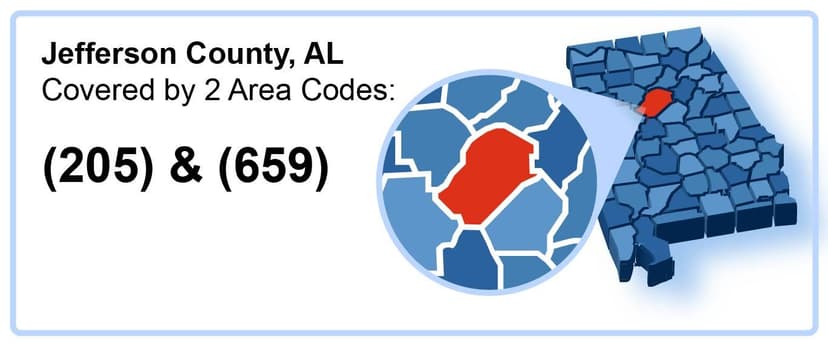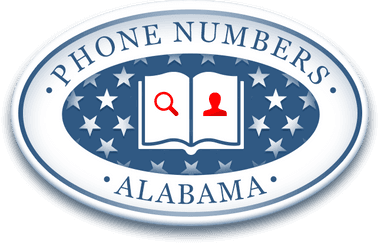What are Jefferson County Area Codes?

The switch to the North American Numbering Plan (NANP) led to the creation of Numbering Plan Areas (NPAs). Area codes, represented by three digits preceding telephone numbers, were assigned to NPAs. The area codes in Alabama are under the supervision of the Alabama Public Service Commission (PSC), as authorized by the Federal Communications Commission (FCC).
Two area codes are currently in use in Jefferson County. These are:
Area Code 205
Established in 1947 as one of the original 86 codes, area code 205 formerly served the entire Alabama territory. Currently, it serves Jefferson County and its nearby counties. Jefferson County cities and towns under the 205 NPA include Birmingham, Hoover, Vestavia Hills, Bessemer, Homewood, Mountain Brook, Center Point, Hueytown, Gardendale, and Irondale.
Area code 659
Area code 659 is an Alabama telephone overlay code in the NANP. The PSC introduced it in 2019 as an overlay on the 205 NPA.
What are the Best Cell Phone Plans in Jefferson County?
Alabama has excellent cell coverage, with two of the four national telephone carriers covering nearly all of the state’s territory. AT&T extends the widest in Alabama, covering 98.8% of the state and Verizon’s 96% coverage is not far off. T-Mobile’s 82.6% coverage comes third but Sprint’s coverage is rather sparse, with only 37.5% of Alabama covered.
Landline ownership is rapidly declining in Alabama as other telephony services are surpassing it as the primary means of telecommunication. A 2018 CDC survey highlighted a shift to wireless service and reported that over half of Alabama adults, 57.6%, were exclusive wireless subscribers. Only about 5.8% of adults use only landlines in their homes. Only 2% of minors in the state resided in landline-only homes while wireless-only households accounted for about 71.6% of the demographic.
Voice over Internet Protocol (VoIP) is a modern telephony service that serves as another alternative to traditional landlines. Many landline subscribers are migrating to VoIP to enjoy the diverse features offered as well as VoIP’s flexibility and lower cost. VoIP subscribers can enjoy phone services on internet-enabled devices like smartphones, computer systems, and even landlines equipped with VoIP adapters.
What are Jefferson County Phone Scams?
This is the use of telephony services (live calls, automated calls, and text messages) to scam Jefferson County residents and extort money and sensitive information. The Alabama Attorney General’s Office has identified many of the state’s prevalent telephone scams and distributed information on these scams to help residents avoid them. The identified scams include:
What are Imposter Scams?
Scammers call residents and claim to be from the Attorney General’s Office. In other instances, the scammers claim to be law enforcement officers with the Sheriff’s Office or local police departments. They coerce residents into sending money or providing personal information to purportedly clear active arrest warrants. Authorities warn residents that the Attorney General’s Office and law enforcement officers do not demand money to clear outstanding warrants. Dial (334) 242-7335 to report imposter scams to the Attorney General’s Office or file an online consumer complaint.
What are Jury Duty Scams?
Criminals impersonate court officials and call Jefferson County residents to inform them of missed jury duty that resulted in bench warrants. The scammers ask for payments from their victims to clear these made-up warrants. Sometimes, the fraudsters ask targets to confirm their personal information by reading it out to them. They claim to need it to confirm that the notifications of the arrest warrants got to them. Residents who do this provide information that the criminals use to commit identity fraud. Never reveal sensitive information to anyone over an unsolicited phone call. Report jury duty scams to the Attorney General’s Office by calling (334) 242-7335 or submitting an online complaint.
What are IRS Phone Scams?
Fraudsters call Jefferson County residents and introduce themselves as Internal Revenue Service (IRS) officials. They claim these residents owe taxes and threaten them with arrest if they do not make immediate payments. The callers ask that the payments be made by retail gift cards, prepaid debit cards, and wire transfers. The IRS will not call tax defaulters to threaten arrest and do not receive payments by pre-loaded debit cards and such irregular means. The IRS asks residents to call 1 (800) 829-1040 to verify any issues concerning tax payments. Use the online complaints assistant of the Federal Trade Commission (FTC) to lodge complaints.
What are Credential Scams?
These scams involve criminals falsifying their qualifications to sell bogus investment opportunities to victims. Fraudsters attach “Senior Specialist” and such important titles to their names while introducing themselves to targets. This, they believe, earns them a certain level of legitimacy with their potential victims. The Alabama Securities Commission (ASC) alerts residents to these occurrences and asks them to verify the backgrounds of individuals selling investment opportunities to them. Carry out your due diligence and seek third-party opinions before accepting investment offers. Residents can confirm the registration status of any financial institution or individual offering investment opportunities by calling the ASC on 1 (800) 222-1253. Also, report credential scams to the FTC by using the online complaints assistant.
What are Tech Support Scams?
To execute these scams, fraudsters pose as technical support staff of major tech companies to gain access to Jefferson County residents’ computers. The scammers attempt to steal private information and extort money under the guise of carrying out repairs on their computers. In a scam alert, the Attorney General’s Office warned residents not to deal with tech support officials who make unsolicited contact with them. Initiate direct contact with Microsoft on (800) 642-7676 or Apple on (800) 275–2273 if you have any issue with your computer. Alternatively, contact a local computer repair shop for assistance. Residents who are victims of tech support scams can report them to the FTC.
What are Charity Scams?
Fraudsters claim to represent charity organizations and solicit donations from county residents. Donations made are diverted to the scammers’ accounts. Typically, the criminals use fake names that are similar to reputable charity organizations to imply they are affiliated. A scam alert issued by the Attorney General’s Office advised Jefferson County residents to make necessary inquiries and confirm the registration statuses of charities before making donations. Use the online consumer complaint form to report charity scams to the Attorney General’s Office or dial (334) 242-7335.
To avoid these phone scams, Jefferson County residents can learn how to execute reverse phone number lookups. A phone number search can reveal information on the registrant of a phone number. An answer to the question “who is this number registered to?” can aid residents in spotting any discrepancies in the scammers’ claims.
What are Robocalls and Spam Calls?
Robocalls are automated phone calls that deliver pre-recorded messages. Automated dialing machines place robocalls to random or selected numbers and relay the already recorded messages to the recipients. Telemarketers, political campaigns, and agencies making emergency announcements use robocalls as legitimate tools to reach consumers. However, scammers seeing the potential of using robocalls to reach multitudes of targets have adopted and abused them.
Combating robocalls and spam calls is high on the agenda of several government agencies. The US Congress recently passed the Telephone Robocall Abuse Criminal Enforcement and Deterrence (TRACED) Act that recommended severe punishments against robocall violators. Manufacturers of mobile communication devices offer call filtering and call blocking features to curb unwanted spam calls. Network operators also offer call filtering and call blocking services to subscribers. Some operators charge for this service while others offer them freely with subscribers’ phone plans.
Take the following steps to curb robocall abuse:
- Ignore calls from unknown numbers. Instead, let them go through to voicemail. Go through messages in your voicemail and call back those that left valid messages. Block suspected spam numbers.
- Set a password for your voicemail to guard against hacking.
- End any robocall as soon as you recognize it. Ignore the voice prompt to push any button in order to avoid more robocalls.
- Make inquiries from your network provider on the most suitable call blocking service available to you.
- Download third-party call blocking apps from your phone’s app store and use them.
- Place your number on the National Do Not Call Registry online or dial 1 (888) 382-1222 from the number you wish to add to the list. Registering will alert authentic telemarketers not to robocall your number.
- Report robocall abuse to the FTC.
How to Spot and Report Jefferson County Phone Scams?
Reporting phone scams to relevant authorities may lead to the apprehension of phone scammers and help law enforcement agencies understand how scammers operate. Jefferson County residents should avoid phone calls that involve the following:
- Calls that notify you of lottery winnings that can only be received after payment of clearance fees or taxes.
- Threats of arrests from people claiming to be government and law enforcement officials over unpaid taxes or missed jury duty.
- Business investment proposals that require urgent funding but afford you no time to carry out necessary research.
- Payment requests via irregular and hard to trace methods. Avoid any transactions with unknown callers that only give you gift cards, wire transfers, and pre-loaded debit cards as the means of payment.
- Calls from government officials seeking personal information. Unless you initiated the call through verified phone numbers, do not share your personal information with anyone.
With scammers getting more creative by the day, different government agencies track new phone scams and educate citizens on avoiding them. Jefferson County residents get regular updates on scams and platforms to report scams from these agencies:
The Federal Trade Commission (FTC) exists to promote fair trade and protect the interests of consumers. They offer guides that help to identify common phone scams and avoid robocalls. The FTC manages the National Do Not Call Registry. To report scams, complete the online consumers’ complaints assistant page provided by the FTC.
The Federal Communications Commission (FCC) regulates the telecommunications industry. Jefferson County residents get resources on how to identify spoofing and activate call blocking from the FCC. The FCC has also mandated telephone carriers to improve caller authentication, as this will eradicate spoofing. Report phone spoofing and other phone scams online to the FCC.
The Alabama Attorney General’s Office issues scam alerts regularly. These alerts have been archived and are available to Jefferson County residents. The Attorney General’s Office has a database of registered charities and businesses. Report scams to the Attorney General’s Office by dialing (334) 242-7335 or submit an online consumer complaint.
The Sheriff’s Office in Jefferson County apprehends criminals and brings them to justice. Crimestoppers, a program founded by the Birmingham Area Crime Stoppers in 1981, is housed at the Criminal Investigation Division of the Sheriff’s Office, and they contribute significantly to crime prevention. Dial (205) 254-7777 to report tips anonymously to Crimestoppers. Victims can also report scams to the Sheriff’s Office by email or by calling (205) 325-5700.
